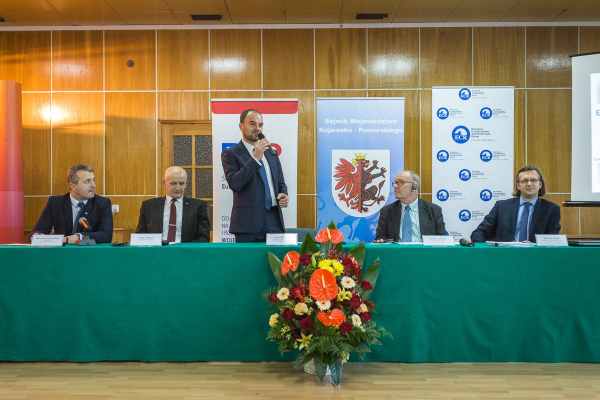ECR Poland conference: achieving a more localist EU Cohesion Policy post-2020

Members of CoR came together with local and regional politicians and stakeholders in Poland's Kujawsko-Pomorskie region to engage in a local dialogue over the future of the European Union's Cohesion Policy.
As part of the ECR Group's ongoing localism work looking at how the principle of empowering local communities can help lead European reform, a conference was organised in Przysiek, in Poland's Kujawsko-Pomorskie region on Thursday 17 November 2016. The event specifically looked at how localism can be used to create an improved European Union post-2020, addressing challenges and identifying opportunities for the future of the EU's Cohesion Policy.
Moderated by Adam Banaszak, Vice-President of Kujawsko-Pomorskie Regional Assembly and leader of the Polish delegation in the ECR Group in the Committee of the Regions, panellists included Jerzy Zająkała (Mayor of Łubianka) and Alderman Gordon Keymer CBE FCA, Patron and former President of the ECR Group.
Chairing the debate, Mr Banaszak said: "the focus for this conference was to look at how the EU's Cohesion Policy, and importantly the funds that go with it, can be used more effectively to benefit more local people across the EU."
"From the event, it was clear that there is a consensus for local funds to be channeled through to local regions and authorities more effectively. This can be done by cutting red tape and reducing barriers, ensuring money returns to LRAs more quickly and more efficiently."
First adopted by European leaders in June 2010, Europe 2020 is the EUs ten-year growth strategy which aimed to help achieve cohesive development. It sets out five ambitious objectives on the following areas: employment, innovation, education, social cohesion and climate/energy. Member States must adopt each objective into their own national targets.
Questions raised at the conference focused on how the idea of localism, one of the ECR Group's founding principles, can help shape a better, reformed Cohesion Policy that has its focus solely on improving the lives of EU citizens in local regions and authorities. Audience members were then able to hear from representatives of Poland, including the Governor of the Kujawsko-Pomorskie region Mikołaj Bogdanowicz, and Michał Korolko, Director of Economic Development Department and International Cooperation from the Office of the Kujawsko-Pomorskie Regional Council.
Discussing the downfalls to the EU's Cohesion Policy, Jerzy Zająkała said: "The cohesion policy objectives set some decades ago have still not been achieved and recent Eurostat figures show just how much still has to be done to attain the goal of governance."
"The EUs cohesion policy should be continued but the Cohesion Policy instruments need to be made simpler, and priority must be given to applying development mechanisms based on a sustainable approach."
As one of the largest beneficiaries of Cohesion Policy, the continuation of the policy after 2020 is fundamental for local and regional authorities in Poland. However, the country believes that funds need to be better tailored to the needs of local communities.
Discussing the main outcomes from the event, Adam Banaszak concluded: "It was great to hear from many Polish citizens and representatives from Polish local and national governments today, who all agreed that continuing the Cohesion Policy post-2020 will ensure our communities are further developed and supported."
"However, it is clear from the comments raised today that much work needs to be done to make the cohesion funds more tailored to the needs of local people. I hope the EU will take note of the opinions expressed here today when drafting the new Cohesion Policy."

